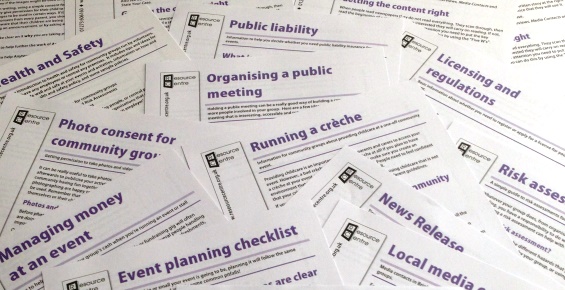Information
We aim to provide straightforward, useful information to help people run community and voluntary groups.
Our information pages are simply written and aim to cover the essentials of running a group and its activities.
We aim to update these information pages regularly and add new ones when we can.
If you are looking for information on something not listed here, please contact us – we may be able to help.
Our main focus is supporting community groups in Brighton & Hove, but our resources are also open to groups based in Sussex. If you are a group based outside of Sussex, you are very welcome to access our information online, but we are limited in the advice we can give in person (e.g. over the phone), particularly as it can get very busy in our open-access Centre.
Choose a category from the menu or from this list:
- Starting a group
- Raising Money
- Managing Money
- Making your group work well
- Organising events and activities
- Getting your message across
Or browse our full selection of information sheets below, A to Z:
- A community group’s guide to radio and TV interviews
- AGM checklist
- Bank accounts for community groups
- Beginners guide to printing
- Budgets for community groups
- Chairing a meeting
- Charity registration
- Charity reporting and accounts
- Constitutions
- Covid-19 risk assessments
- Data protection for community groups
- Days out in Sussex for community groups
- Designing and using surveys
- Equality and diversity policies for small groups
- Event planning checklist
- Examination of accounts
- Facebook for community groups
- Financial rules
- Fundraising from local businesses
- Fundraising from trusts
- Fundraising ideas
- Getting a group started
- Health and safety for community groups
- How much money do we have?
- How to improve your chairing skills
- How to make your neighbourhood newsletter look good
- How to write clearly
- Hybrid meetings (in person and online)
- Independent examination of accounts at the Resource Centre
- Involving people in your group
- Is your AGM coming up?
- Legal structures for community groups and not for profit organisations
- Licensing and regulations for events and fundraising activities
- Making your activities and events accessible
- Managing funds for short-lived crisis-response groups
- Managing money at an event
- Monitoring and evaluation
- Organising a letter writing campaign
- Organising a petition
- Organising a public meeting
- Organising online activities and events
- Planning a funding application
- Planning a neighbourhood newsletter
- Planning and running a campaign
- Quick tasks for treasurers during the pandemic
- Public liability and employers liability
- Reporting to a funder
- Responsibilities of registered charities
- Responsibilities of the management committee
- Risk assessment
- Roles of officers
- Running a creche
- State your case: how to write a campaign briefing
- Support for chairs
- Support for Resource Centre member groups
- Support for secretaries
- Support for Tenants’ and Residents’ Associations
- Support for treasurers
- Support with producing newsletters
- Support with publicity and printing
- Support with raising money
- Taking minutes
- Taking photos at community events
- The agenda
- The secretary’s role
- Treasurer’s role
- Using the Disclosure and Barring Service (DBS)
- Video and telephone meeting tools
- Video making tips for community groups
- What will you put in your neighbourhood newsletter?
- Writing a funding application
- Writing a news release
- Your group’s money




